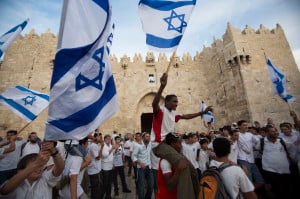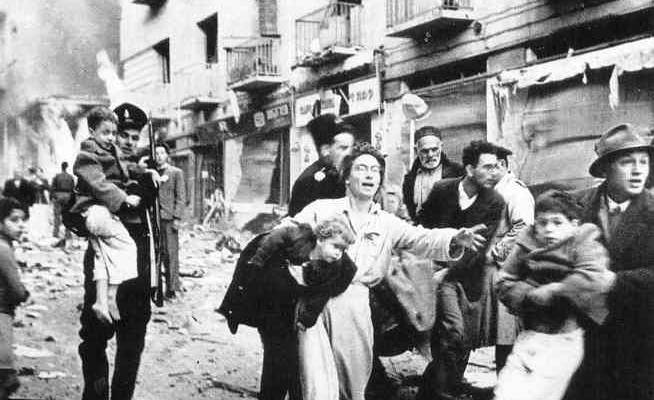On February 22, 1948, Palestinian Arab terrorists, with the help of British deserters, bombed Ben Yehuda Street in Jerusalem. It was the first of many that would occur over the years in that location.
During the first phase of Israel’s War of Independence, Palestinian Arab terrorists, with the cooperation of deserters from the British Mandatory forces, bombed Ben Yehuda Street in central Jerusalem on February 22, 1948. It was the first of several bombings on Ben Yehuda Street in the history of the Israeli-Arab conflict.
On February 22, 1948, at about 6:30 in the morning, three men dressed as British soldiers and police drove to the corner of Ben Yehuda and Ben Hillel Streets. They passed through British and Jewish checkpoints with no problems, owing to their seeming British identity. One of these men was Azmi Djaoumi, a Palestinian Arab. The others were Eddie Brown and Peter Madison, British deserters. They were driving an armored car and two truck bombs loaded with explosives, prepared by SS-trained Fawzi el Kuttub, the master saboteur of the Arab Palestinians in Jerusalem. The bombings had been ordered by Abdel Khader El Husseini, who intended to terrorize the Jews into leaving Jerusalem. Brown and Madison had carried out the Palestine Post (later the Jerusalem Post) bombing – the first car bombing in history – three weeks earlier, which killed one person, seriously injured many, and destroyed the office and equipment as well as causing damage to adjacent buildings.
The bombers lit the explosives and fled. The explosion demolished four buildings and shattered windows in a large area. Various casualty figures are given. According to Collins and LaPierre, 1973, 54 people were killed. According to Yair Sheleg (2001), 52 corpses were found under the rubble and 32 people were injured. Six of the injured died subsequently. Yitzhak Levi (1986) listed 47 dead. According to Levi, 1986 (p. 440), casualties were: 2 soldiers killed, 14 wounded, 47 civilians killed, 126 wounded.
One of the trucks had been parked near the Atlantic Hotel, at the corner of Ben Hillel and Ben Yehuda Streets, where the “furmanim,” those who guarded the Palmach convoys, usually stayed. British police chased the attackers, but they cried out “Explosion!” The fact that they seemed to be all British misled the police, who anyhow preferred to get away as soon as possible.
Dr. Meron Benvenisti, a boy of 14 at the time, relates that he arrived at the site of the explosion with friends from the youth movement; they were asked to help clear the rubble. “The British offered earth-moving equipment, on condition that they themselves operate it,” he recounts, “but the Jewish Agency refused, so that’s how they brought us in to do the work. I remember that I bent down to clear something and suddenly I saw a human hand sticking out of the rubble. This is a sight that I will of course never forget. The roof of the Orion Cinema, which was located nearby, was blasted off entirely by the force of the explosion, and for years the cinema had only a tin roof, and when it rained you couldn’t hear the films that were being screened.”
The Irgun and LEHI underground avenged the attack. Irgun killed a British officer, a sergeant and two British drivers near the Jewish Agency buildings, while the Lehi killed 10 British policemen.
Palestinian Arab Terrorists Continue Pattern of Denial
Madison and Brown, having been promised a thousand pounds sterling from the Grand Mufti Hajj Amin Al Husseini for the Ben Yehuda bombing, went to Cairo to collect their reward, but the Mufti laughed at them and refused to pay up. Though Abed al-Kader al-Husseini announced to the press that it was he who was responsible for the attack, the Supreme Arab Committee, which was afraid of international censure, released a statement, authorized by the Mufti, denying Al-Husseini’s announcement. This pattern of maintaining deniability was to be imitated by Palestinian Arab terrorist groups in the future.
Ben Yehuda Street and nearby Zion Square have been the site of additional Palestinian terrorist bombings. On Friday, July 4, 1975, a refrigerator with five kilograms of explosives packed into its sides exploded in Zion Square. Fifteen people were killed in the explosion and 77 were injured. On September 4, 1997, three suicide terrorists of the Izzedin el Qassam military organization of the Hamas blew themselves up simultaneously along the pedestrian mall, killing four Israelis including two 14-year-old schoolgirls. On December 1, 2001 two suicide bombers detonated themselves on Ben Yehuda Street, followed by a car bomb that went off as paramedics arrived. Ten people were killed, including many children, and 188 were injured in the terrorist attacks. Numerous other attempts were foiled.
By: Zionism and Israel Information Center

Sign the Declaration to Keep Jerusalem United
Jerusalem Must Remain the United Capital of Israel
I declare that Jerusalem is the eternal capital of the Jewish People and support all efforts to maintain and strengthen a united Jerusalem as the undivided capital of the State of Israel.
See our Privacy Policy